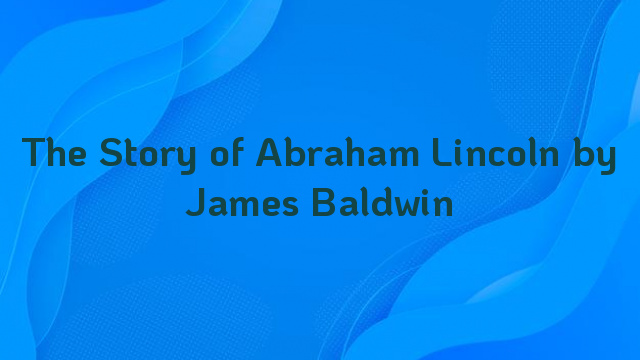
The Story of Abraham Lincoln by James Baldwin
Chapter VIII: The Black Hawk War
There were still a good many Indians in the West. The Sac Indians had lately sold their lands in northern Illinois to the United States. They had then moved across the Mississippi river, to other lands that had been set apart for them.
But they did not like their new home. At last they made up their minds to go back to their former hunting-grounds. They were led by a chief whose name was Black Hawk; and they began by killing the white settlers and burning their houses and crops.
This was in the spring of 1832.
The whole state of Illinois was in alarm. The governor called for volunteers to help the United States soldiers drive the Indians back.
Abraham Lincoln enlisted. His company elected him captain.
He did not know anything about military tactics. He did not know how to give orders to his men. But he did the best that he could, and learned a great deal by experience.
His company marched northward and westward until they came to the Mississippi river. But they did not meet any Indians, and so there was no fighting.
The young men under Captain Lincoln were rude fellows from the prairies and backwoods. They were rough in their manners, and hard to control. But they had very high respect for their captain.
Perhaps this was because of his great strength, and his skill in wrestling; for he could put the roughest and strongest of them on their backs. Perhaps it was because he was good-natured and kind, and, at the same time, very firm and decisive.
In a few weeks the time for which the company had enlisted came to an end. The young men were tired of being soldiers; and so all, except Captain Lincoln and one man, were glad to hurry home.
But Captain Lincoln never gave up anything half done. He enlisted again. This time he was a private in a company of mounted rangers. The main camp of the volunteers and soldiers was on the banks of the Rock river, in northern Illinois. Here, one day, Abraham Lincoln saw a young lieutenant of the United States army, whose name was Jefferson Davis. It is not likely that the fine young officer noticed the rough-clad ranger; but they were to know more of each other at a future time.
Three weeks after that the war was at an end. The Indians had been beaten in a battle, and Black Hawk had been taken prisoner.
But Abraham Lincoln had not been in any fight. He had not seen any Indians, except peaceable ones. In June his company was mustered out, and he returned home to New Salem.
He was then twenty-three years old.
Chapter IX: In the Legislature
When Abraham Lincoln came back to New Salem it was nearly time for the state election. The people of the town and neighborhood wanted to send him to the legislature, and he agreed to be a candidate.
It was at Pappsville, twelve miles from Springfield, that he made his first campaign speech.
He said: “Gentlemen and fellow-citizens—
“I presume you all know who I am.
“I am humble Abraham Lincoln. I have been solicited by my friends to become a candidate for the legislature.
“My politics are short and sweet.
“I am in favor of a national bank; am in favor of the internal improvement system, and a high protective tariff.
“These are my sentiments and political principles. If elected, I shall be thankful; if not, it will be all the same.”
He was a tall, gawky, rough-looking fellow. He was dressed in a coarse suit of homespun, much the worse for wear.
A few days after that, he made a longer and better speech at Springfield. But he was not elected.
About this time a worthless fellow, whose name was Berry, persuaded Mr. Lincoln to help him buy a store in New Salem. Mr. Lincoln had no money, but he gave his notes for the value of half the goods.
The venture was not a profitable one. In a few months the store was sold; but Abraham did not receive a dollar for it. It was six years before he was able to pay off the notes which he had given.
During all this time Mr. Lincoln did not give up the idea of being a lawyer. He bought a second-hand copy of Blackstone’s Commentaries at auction. He studied it so diligently that in a few weeks he had mastered the whole of it.
He bought an old form-book, and began to draw up contracts, deeds, and all kinds of legal papers.
He would often walk to Springfield, fourteen miles away, to borrow a book; and he would master thirty or forty pages of it while returning home.
Soon he began to practice in a small way before justices of the peace and country juries. He was appointed postmaster at New Salem, but so little mail came to the place that the office was soon discontinued.
He was nearly twenty-five years old. But, with all his industry, he could hardly earn money enough to pay for his board and clothing.
He had learned a little about surveying while living in Indiana. He now took up the study again, and was soon appointed deputy surveyor of Sangamon county.
He was very skilful as a surveyor. Although his chain was only a grape-vine, he was very accurate and never made mistakes.
The next year he was again a candidate for the legislature. This time the people were ready to vote for him, and he was elected. It was no small thing for so young a man to be chosen to help make the laws of his state.
No man ever had fewer advantages than Abraham Lincoln. As a boy, he was the poorest of the poor. No rich friend held out a helping hand. But see what he had already accomplished by pluck, perseverance, and honesty!
He had not had access to many books, but he knew books better than most men of his age. He knew the Bible by heart; he was familiar with Shakespeare; he could repeat nearly all the poems of Burns; he knew much about physics and mechanics; he had mastered the elements of law.
He was very awkward and far from handsome, but he was so modest, so unselfish and kind, that every one who knew him liked him. He was a true gentleman—a gentleman at heart, if not in outside polish.
And so, as I have already said, Abraham Lincoln, at the age of twenty-five, was elected to the state legislature. He served the people so well that when his term closed, two years later, they sent him back for another term.
The capital of Illinois had, up to this time, been at Vandalia. Mr. Lincoln and his friends now succeeded in having a law passed to remove it to Springfield. Springfield was nearer to the centre of the state; it was more convenient to everybody, and had other advantages which Vandalia did not have.
The people of Springfield were so delighted that they urged Mr. Lincoln to come there and practice law. An older lawyer, whose name was John T. Stuart, and who had a good practice, offered to take him in partnership with him.
And so, in 1837, Abraham Lincoln left New Salem and removed to Springfield. He did not have much to move. All the goods that he had in the world were a few clothes, which he carried in a pair of saddle-bags, and two or three law books. He had no money, and he rode into Springfield on a borrowed horse.
He was then twenty-eight years old.
From that time on, Springfield was his home.




